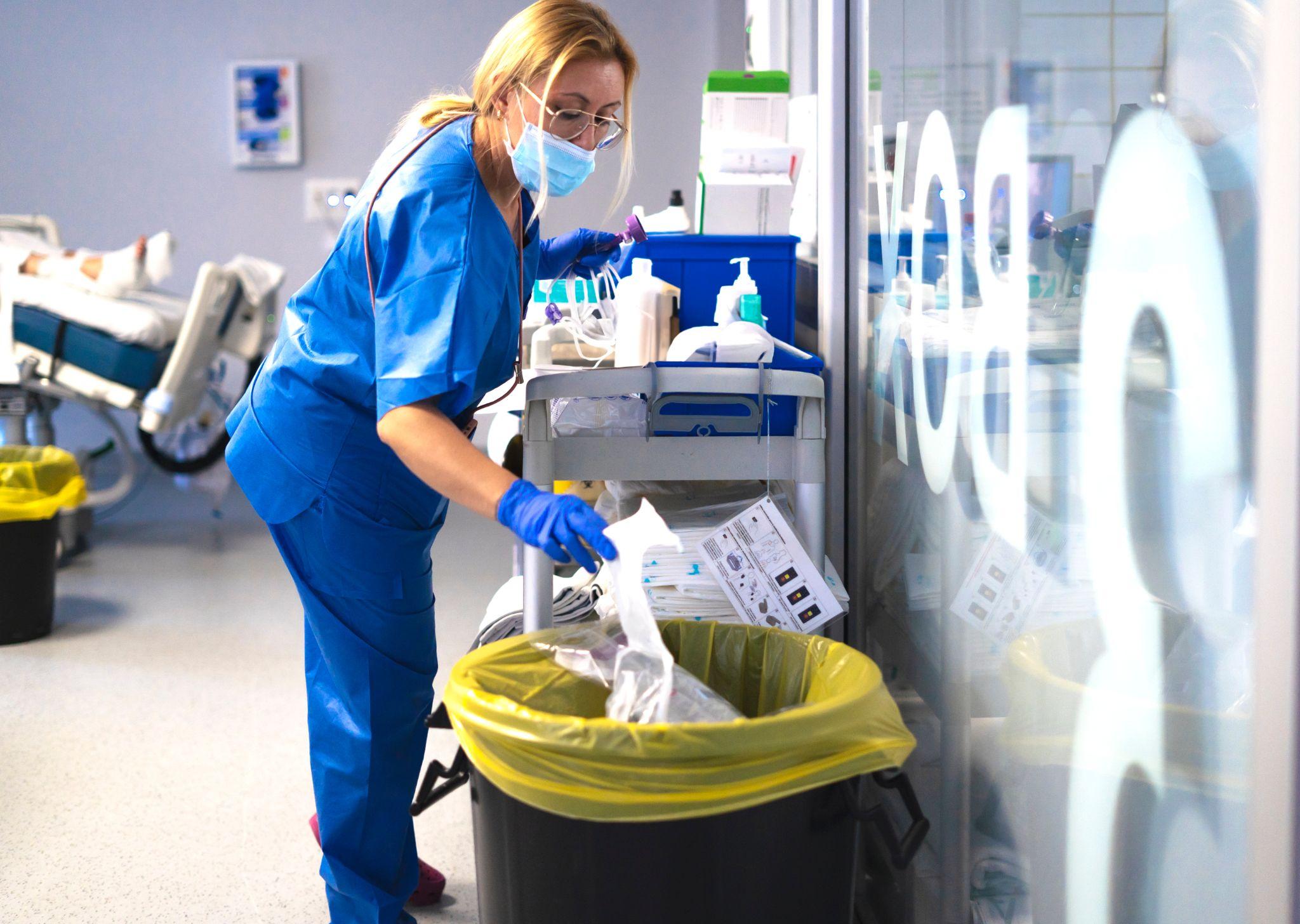CALL NOW FOR A FREE QUOTE 866.760.8194
A Review of Medical Waste Disposal Best Practices
Hospitals, dental offices, laboratories, veterinary clinics, and other organizations that generate medical waste share a critical responsibility: safe and compliant disposal. Improper disposal of medical waste can result in environmental harm, spread of infectious materials, and costly regulatory violations.
Below, we’ll review key best practices for you to follow. For guidance specific to medical waste disposal at your facility, check with your state’s environmental or health department or consult a Global Trash Solutions waste management specialist.
Prioritize Safe and Responsible Disposal
Medical waste management begins with promoting a culture of safety. Every employee—from clinical staff to custodial teams—plays a role in protecting patients, coworkers, and the community. Organizations should prioritize training and education to ensure that all personnel understand what constitutes medical waste, how to handle it, and the potential risks it poses.
Encourage open communication around safety protocols and reporting. Staff should feel empowered to speak up about unsafe practices or incidents without fear of reprisal. Visible signage, written procedures, and regular refresher courses can also reinforce positive habits.
Additionally, use labels and containers approved by the Occupational Safety and Health Administration (OSHA) and Environmental Protection Agency (EPA). This minimizes the risk of accidental exposure or cross-contamination. It also sets the tone for a facility-wide commitment to safe medical waste disposal.
Categorize and Segregate Waste at the Source
The most effective waste management systems begin at the point of generation. Segregating waste into the appropriate categories prevents contamination and ensures each type is disposed of correctly. Medical waste can include:
- Infectious Waste: Items contaminated with substances such as blood, bodily fluids, or other potentially infectious materials.
- Pathological Waste: Biohazard waste that includes human or animal tissues, organs, or body parts.
- Sharps: Needles, scalpels, and other medical disposables capable of puncturing skin.
- Pharmaceutical Waste: Expired, unused, or contaminated medications.
- Chemical and Cytotoxic Waste: Laboratory reagents or cancer treatment drugs.
Segregation not only keeps waste streams clean. It also avoids mixing hazardous and non-hazardous waste, which increases disposal expenses unnecessarily. Using color-coded bags and containers—typically red for biohazard waste, yellow for infectious materials, and blue or white for sharps—simplifies compliance and handling.
Finally, waste should be bagged or contained immediately at the source, never transferred or sorted. This minimizes the chance of exposure and ensures regulatory adherence.
Stay Compliant With State and Federal Regulations
Compliance is the backbone of medical waste management. Both federal and state agencies regulate how medical waste is handled, stored, transported, and treated. At the federal level, the EPA, OSHA, and the Department of Transportation (DOT) establish key requirements that cover labeling, worker safety, and waste transport.
However, state and local regulations often impose additional, more detailed rules. Depending on the state where your facility is located, the following may apply:
- State laws that more specifically define regulated medical waste
- Mandates on specific treatments such as autoclaving or incineration
- Time limits for on-site storage of hazardous materials
Facilities should maintain a current understanding of all applicable laws and update internal policies accordingly.
Documentation is also critical for demonstrating compliance. Maintain detailed manifests, disposal logs, and employee training records. Conduct internal audits (with the aid of a compliance expert) at least annually to ensure the latest protocols and regulations are followed.
Handle and Store Waste Safely
Proper handling and storage procedures protect employees and reduce risk. Medical waste should always be:
- Contained in leak-proof, puncture-resistant, and labeled containers
- Stored in a secure area away from food, clean supplies, or public access points
- Removed from storage regularly to prevent odors, pests, and overaccumulation
Temperature control can also play a role. Some states require refrigeration for certain categories of waste—especially pathological or tissue waste—if it’s stored for more than a few days.
When handling sharps, always use approved containers and never attempt to recap, bend, or remove needles manually. Staff should also wear appropriate personal protective equipment (PPE), including gloves, face shields, and gowns.
Train employees on proper lifting and transport methods to avoid injuries. Even non-infectious waste can be heavy or awkward to move. With proper training, strains and accidents can be prevented.
Finally, ensure that spills or leaks are addressed immediately using approved disinfectants and cleanup materials, and document every incident for future safety reviews.
Partner With Experienced Waste Management Providers

Working with an experienced waste management partner adds an extra layer of assurance. It ensures waste is transported, treated, and disposed of according to all regulatory standards. The contractor can also conduct waste audits, optimize pickup schedules, and identify opportunities to reduce volume and costs.
Industry experts help businesses stay compliant and focus on their core operations rather than risking improper disposal of medical waste.
Contact Global Trash Solutions
Global Trash Solutions (GTS) specializes in helping organizations streamline waste management operations. Our medical waste brokers and consultants connect clients with vetted disposal vendors, negotiate competitive rates, and provide expert guidance. Whether you manage a large hospital, a veterinary clinic, or a research lab, GTS offers the expertise and network to help your facility with medical waste disposal. Call us at 866-760-8194 to get started.
Recent Post
Why Should Your Business Hire a Waste Consultant?
Waste management often operates on autopilot. Trash is collected, invoices are paid, and…
Read More >Avoiding Waste Management Fines in NYC: What Businesses Need to Know
Waste management fines are becoming a real operational risk for commercial businesses across…
Read More >